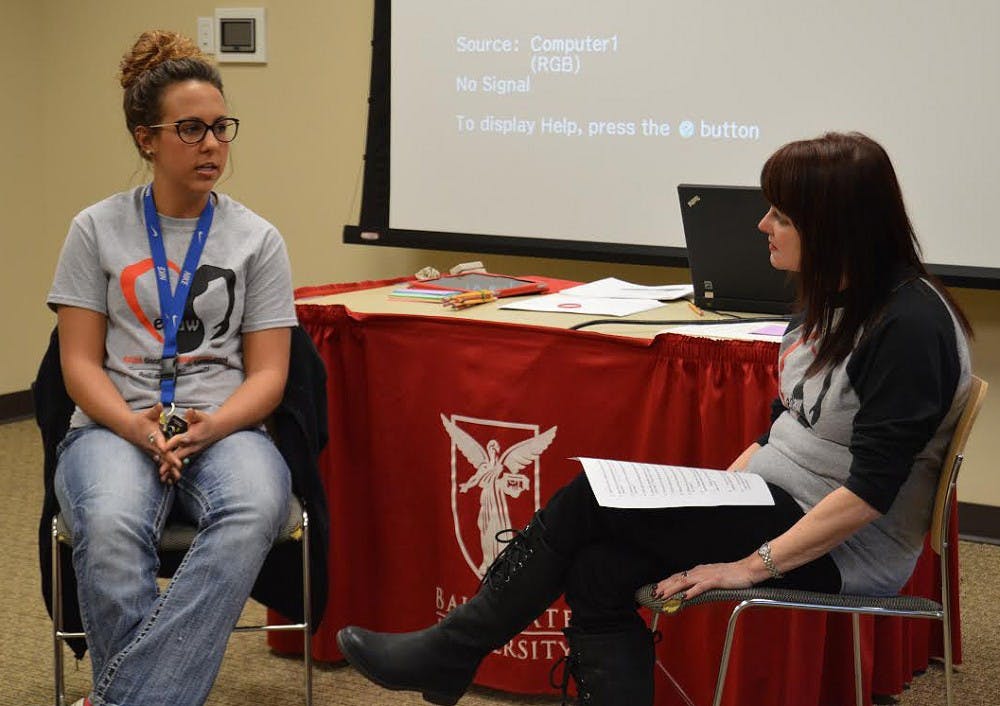| Eleven million people in the country struggle with eating disorders every day, according to Eating Disorder Hope. |
It’s one thing to listen to a counselor or psychiatrist talk about the struggles that come with an eating disorder and recovery, but it's another thing to hear a student’s story in person.
That was the thinking behind Associate Director of the Counseling Center Ellen Lucas’ discussion on eating disorders on Feb. 25.
Betsy Huffman, a freshman exercise science major, shared her story of recovering from an eating disorder for the first time.
The long road of fighting the disorder started when Huffman developed anorexia at the beginning of eighth grade.
“I saw one of my closest friends start to get smaller and lose weight, and for some reason I felt like I needed to do the same,” Huffman said. “I was never really a big girl, or bullied, and no one ever told me I was fat. At that time, it was more peer pressure with wanting to fit in and be prettier and have people like me. I thought being skinny would do that.”
READ: Eating disorders will grow until awareness is spread, counselor says
Huffman started restricting food by becoming a vegetarian, and then she later tuned into a vegan.
She began to think about starving herself once she started to see changes in her weight.
“In my mind, I told myself I looked good,” Huffman said. “I believed I would be OK, but I still wasn’t healthy.”
Huffman said she would maybe only eat twice over a couple of days and would only allow herself to drink water.
There was also a point when she would chew food and then spit it out just to have the taste of it in her mouth without actually eating.
As a freshman and sophomore in high school, Huffman weighed around 100 pounds.
Along with the physical changes, Huffman said she became a different person socially as well.
“My social life completely changed and I actually became a really depressed, hateful person,” Huffman said. “I would go to school and then come home and sit in my bedroom in the dark for the rest of the night. I didn’t want to be around or talk to anyone.”
Huffman said she lost the sparkle of life in her eyes.
During the struggle, Huffman experienced constant pains, felt lightheaded and weak, and turned to cutting. She blacked out once.
At the same time, Huffman developed an addiction to laxatives.
“I wanted to change but when I started to eat more, I was still obsessed with being small so I turned to the laxatives,” Huffman said. “I figured if I took the pills, it would set off the food I was eating — which it did — but it was the worst thing I had ever done.”
She would take up to six laxatives a day. She said taking those triggered the worst pain she had ever felt in her life.
“I was tired of feeling the way I was and felt like I didn’t have life in me anymore,” Huffman said. “I was always an active person, but when I didn’t have energy anymore, I felt like I didn’t want to live.”
Huffman said her mom threatened to have her institutionalized when she was 16.
“That was a huge trigger and point where I knew it was serious, because I did not want to have to go to the hospital," she said.
But she didn’t stop after the threat from her mom.
That didn’t happen until her boyfriend of three years in high school confronted her.
“My boyfriend didn’t really know about the disorder for a long time. He got with me when I had it so he didn’t see me change as much,” Huffman said. “There was one point when we did talk about it, though, because I completely broke down and showed him all my laxative boxes and talked about what I was going through.”
At first, he was shocked and seemed to not know what to say, but what he told Huffman next stuck with her.
“He did tell me that I was too skinny and that he actually didn’t find me attractive anymore,” Huffman said. “I was sad, but I knew he was right, and at that point I knew it was bad enough, but I just didn’t know how to fix it.”
At first, Huffman thought if she started to eat more it would come naturally, but when it didn’t, she ended up relapsing twice.
“Recovery was a long process, but I felt like I got myself there and I wanted to get myself out,” Huffman said.
She started eating more and more every day and used the gym as her recovery process.
“The gym was what helped me the most. It was a place to release stress and I [became] very healthy,” Huffman said. “I got to the point where I saw muscles grow; that was my new obsession. It wasn’t so much being skinny anymore, it was more about gaining muscle and seeing my body change, feeling my body change, and coming back alive.”
Since then, Huffman said she hasn’t relapsed and will never go back to her eating disorder.
She said the process was hard, but by sticking to the gym and staying away from the scales and mirrors to avoid body checking, she was able to find the positive aspects of herself.
“I learned to accept myself and understand that I was created in a certain way,” Huffman said. “That’s what everyone has to do to get over an eating disorder.”
Huffman said she shared her story to bring change to the stigma around eating disorders and to help those who might be struggling. This past week — Feb. 22 to 27 — was Eating Disorder Awareness Week.
“I don’t want anyone to go through what I went through,” Huffman said. “I want to raise awareness, and if I can help someone come out of an eating disorder, then it’s all worth it.”
Lucas, the associate director at the Counseling Center, said eating disorders have been becoming more prominent in society because of its focus on thinness and body perfection.
"Our society focuses on weight and appearance and associates that with success in our lives, which can be very dangerous," she said.
The Counseling Center offers individual and group counseling, as well as support groups for students recovering from eating disorders.
“We see students from all sorts of stages of recovery," Lucas said. “What we offer is also prevention to talk about healthy eating and weight. ... Eating disorders are very serious, with one of the highest rates being among college students. ... We need to be constantly combating messages within our society on dieting and weight loss and start promoting positive, alternative messages.”





